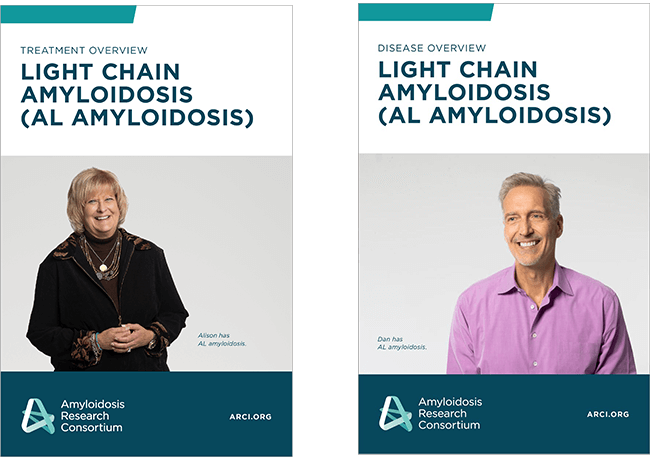
AL Amyloidosis
AL amyloidosis is the most common type of amyloidosis and involves proteins called light chains.
Light chains make up part of the structure of immunoglobulins (antibodies) which play an important part in the immune system. They are produced by plasma cells in the bone marrow.
In AL amyloidosis, abnormal plasma cells make excessive amounts of abnormal light chain proteins. Instead of forming immunoglobulin, they become misfolded and deposit as amyloid in various organs of the body.
3D animated overview of AL amyloidosis
Most AL amyloidosis patients are diagnosed after the age of 50, though some adult patients have been diagnosed as early as their 20s. AL amyloidosis affects both men and women, although there is a slight predominance in males. The pattern of amyloid build-up is different for each patient and often affects more than one organ. Early diagnosis and treatment are essential to prevent or slow disease progression. Major therapeutic advances have been discovered over the last decade. These can put AL amyloidosis into prolonged remission and extend life.
While AL amyloidosis is not a form of cancer, it is often closely associated with the cancer, Multiple Myeloma. Multiple Myeloma and AL amyloidosis are both plasma cell disorders, and many AL amyloidosis treatments have been adapted from Multiple Myeloma treatment protocol. About 10-15% of AL amyloidosis patients also have Multiple Myeloma and receive care for both conditions.
AL Amyloidosis (Light Chain) Educational Booklets
Alison — AL Amyloidosis Patient
A comprehensive presentation on the most current treatments for AL amyloidosis.
Symptoms and complications of AL amyloidosis vary from patient to patient, depending on the organs involved and the extent of damage caused by the amyloid deposits. Any organ apart from the brain can be affected. Signs and symptoms of AL amyloidosis may include:
- Swelling of your ankles and legs
- Fatigue and weakness
- Shortness of breath
- Numbness, tingling or pain in your hands or feet, especially pain in your wrist (carpal tunnel syndrome)
- Diarrhea, possibly with blood, or constipation
- Unintentional, significant weight loss
- An enlarged tongue
- Skin changes, such as thickening or easy bruising, and purplish patches around the eyes
- An irregular heartbeat
- Difficulty swallowing
When AL amyloidosis is suspected, a tissue biopsy will likely be taken to confirm presence of amyloid. Blood and urine tests may be run to measure the amount of abnormal light chains, and a bone marrow biopsy is usually performed to confirm the presence of abnormal plasma cells.
Further blood tests, along with echocardiograms and electrocardiograms, MRI, and/or other imaging scans, may be done to determine whether the heart, kidneys or other organs have been affected by amyloidosis. Organ biopsies may also be carried out to confirm the presence of amyloid deposits.
Treatment for AL amyloidosis is aimed at reducing the level of abnormal plasma cells to eliminate the production of abnormal light chains, improving organ function and improving quality of life.
Several factors such as age, general health and extent of organ damage are taken into account, but usually a combination of different types of drug are given. Many of the treatment options include products typically used to treat multiple myeloma. Possible treatment options include the following:
- Autologous blood stem cell transplant (ASCT) in some patients
- Chemotherapy e.g. cyclophosphamide or melphalan
- Steroid e.g. dexamethasone or prednisone
- Proteasome inhibitor e.g. bortezomib or ixazomib
- Immunomodulatory drug e.g. lenalidomide or pomalidomide
- Monoclonal Antibodies e.g. daratumumab
Supportive treatments are aimed at improving or moderating organ function, maintaining quality of life and prolonging survival while the anti-plasma cell therapy has time to take effect.
Amyloidosis is a multi-system disease, meaning it affects multiple organs. It is important to be seen at a center that has experience in diagnosing and treating your type of amyloidosis. These centers will have a group of different specialists (i.e., cardiologist, hematologist, neurologist) who will be able to provide a comprehensive evaluation and treatment plan. Learn more about ARC’s treatment center finder MAP here.
Learning about clinical trials can be an important part of your care. In a rare disease like amyloidosis treatment options are often limited, and clinical trials may be the best way for you to access new therapies. To learn more about the basics of clinical trials, click here.




